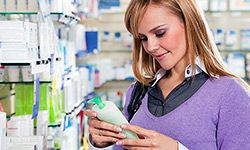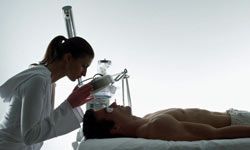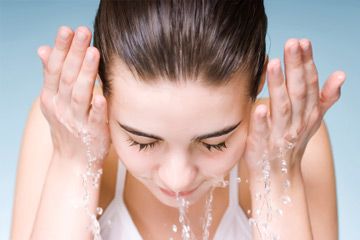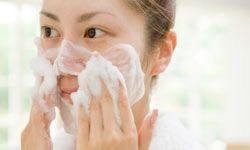您可能听说过这句话:“你就是你吃的东西。”相同的理论对于您的皮肤也是如此:您适用于皮肤的东西直接吸收到您的体内。考虑到皮肤是您人体最大的器官,了解您将您放入系统中是至关重要的。
但是,如果您曾经翻过自己喜欢的面部清洁剂的包装,那么您会注意到一长串不认识的成分。从硫酸盐到parabens,化妆品行业在其产品中使用各种化学物质 - 有些是有益的,但其他化学物质可能有害。他们中的许多人没有为您的外表做任何事情,甚至可能使事情变得更糟。继续阅读以获取五种要避免在洗面奶中的成分的污垢。
广告
1.硫酸钠钠
You know that squeaky clean feeling you get after washing your face? That's due to sodium laurylsulfate纽约市西奈山医院皮肤病学助理临床讲师乔迪·莱文(Jody Levine)说,这是一种使其泡沫添加的常见成分,使其成为泡沫。她说:“这在许多其他个人护理产品(例如洗发水)中也很常见。”但这不仅在美容过道中发现 - 硫酸钠含量也用于洗车,车库地板清洁剂和发动机脱脂剂。
Lauryl硫酸钠的问题在于,它实际上需要保护皮肤需要保护的天然油(在洗发剂中)。莱文说:“这可能非常刺激,尤其是如果一个人对此过敏。”研究表明,即使产品中的适中量也会引起过敏反应[宝拉的选择]。更重要的是,因为它去除了皮肤的天然,防护油,所以身体最终会产生更多的油(您试图摆脱的东西)来补偿。
2.香气
远离花卉香气洗面奶!查看几乎所有家用产品的成分清单(从洗衣粉到洗面奶),您会看到“香气”一词。尽管听起来足够无害,但“香气”一词可以代表数百种化学物质,其中许多化学物质会引起过敏,哮喘发作,头痛等。另外,几乎所有的合成香料都用邻苯二甲酸酯稳定,邻苯二甲酸盐是与生殖问题和动物研究中的先天缺陷有关的一组化学物质[来源:EPA]。
而且这些化学物质当然不会提高洗面奶的有效性。莱文说:“清洁剂中添加的香水往往会刺激性,并且会使皮肤干燥。”“最好避免任何过于香水或香味过于香水。”只是没有香水就无法生存吗?选择使用精油或水果和植物提取物来闻其溶液的产品。
3. Oils
许多产品含有石油和矿物油的成分。化妆品公司喜欢使用它们,因为它们便宜,没有气味,而且永远不会变质。莱文说:“制造商可以将其作为保湿成分放在清洁剂中。”尽管石油确实确实增加了水分,但某些类型会堵塞毛孔,从而导致突破。除非您的皮肤严重干燥,否则Levine建议使用无油的清洁剂。检查成分列表,并确保该产品没有以下内容:丙烯,帕拉弗蛋白,矿物油,丁二烯乙二醇,异丙醇和凡士林。取而代之的是,寻找天然植物油,可提供大量营养,而不会阻塞毛孔。
4. Parabens
“Parabens are preservatives found in most cosmetics and skin care products," says Levine. They keep the product from spoiling by preventing harmful bacteria and fungi from growing inside it. The FDA does not regulate the use of parabens (or any other chemical) in beauty products, and currently they state that there is no reason for consumers to be concerned about the use of cosmetics containing parabens [Source: FDA].
但是,有些人不同意。由于对羟基苯甲酸酯模仿雌激素,因此人们担心它们可能会增加乳腺癌的风险。实际上,2004年发表在应用毒理学杂志detected parabens in breast tumors [Source: FDA]. However, the study did not show that parabens cause cancer, or that they are harmful to the body [Source: FDA]. "There is no concrete link between parabens and any dangerous medical conditions but some people may have a sensitivity and become irritated by the additive," says Levine. To steer clear of these additives, look for the word "paraben" on ingredients labels (it may appear as a suffix).
5.酒精
“Alcohols are often used as the base ingredient in many beauty products," says Levine. They are used for two reason: to make a thick skin-care product feel almost weightless and to help ingredients like retinol and vitamin C penetrate the skin more effectively [Source: Paula's Choice]. Alcohol does this by breaking down the skin's natural barrier.
It may help other ingredients work, but it can be very damaging to the skin, especially if your skin texture is fairly dry. "Alcohol is extremely drying and irritating since it strips the skin's natural barriers," says Levine. One study performed on hospital workers confirmed that regular cleansing with alcohol-based products erodes the skin's barrier [Source: Journal of Hospital Infection]. To keep your face healthy and hydrated, Levine says to avoid products with the following ingredients: isopropyl alcohol, SD alcohol 40 and ethyl alcohol.
广告
Originally Published: Sep 20, 2013






